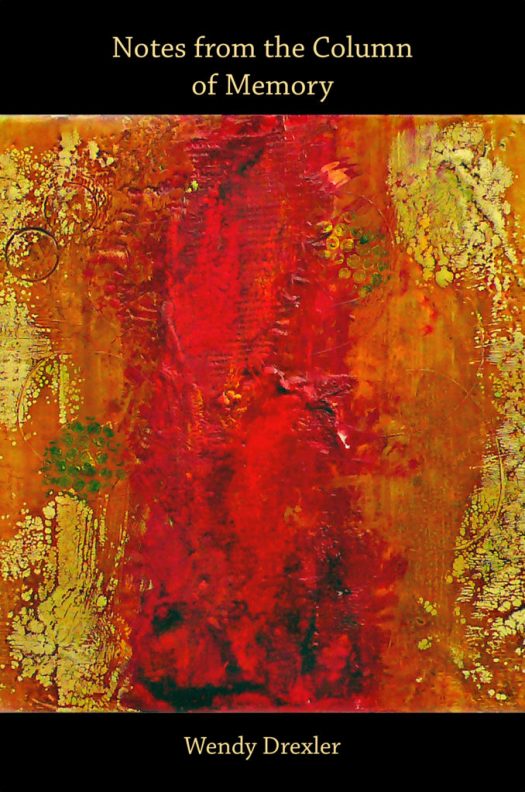I first met Wendy Drexler at Barbara Helfgott Hyett’s table in the early 2010s. At the time, she had just come out with her first full-length book, Western Motel. Since then she’s gone on to publish two more full-length books: Before There Was Before and Notes from the Column of Memory. Wendy’s career is living proof that it’s never too late to become a poet. After years working as an editor, she started writing poetry in her 40s. Since then, she’s gone on to collect a plethora of publication credits, including RHINO, The Threepenny Review, and Mom Egg Review. Her poems have been featured on Verse Daily and WBUR’s Cognoscenti. A four-time Pushcart nominee and a Mass Cultural Council Fellow, her poetry has also appeared in unusual venues such as on the sidewalk in Mass Poetry’s Raining Poetry project and a sculpture installation in Southborough, Mass. I got to know Wendy better during poet educator training, a joint venture with Lesley University and Mass Poetry. I’m proud to call her a friend.
Frances Donovan: Tell me about your new collection, Notes from the Column of Memory.
Wendy Drexler: Notes from the Column of Memory explores the hinge of memory–what we remember and how our memories change, dive, and surface as we reinvestigate the past at different stages in our lives. The past, it seems, is always informing the present. My title poem, which won the 2021 Juror’s Prize at Art on the Trails at the Beals Preserve, Southborough, is written in the shape of a column; it begins, “See how time breaks us / and still we stand.” I’ve placed a crown of sonnets at the center of the book, interrogating rituals of burial and grief (“I hear your silence working its way through the ground”) by interweaving the shamanistic burial of a woman who lived 10,000 years ago in the Levant with the death of my mother when she was 56. I also recall and extend concern for other living beings in a world in which many species are being diminished–from the pet red-eared slider I lost in the grass when I was a child, to the giant Galapagos turtle, and from a rose-breasted grosbeak “called in” by a birder replaying the bird’s own song on a speaker to the groundhog I ran over in my car. Much of this book was written during the pandemic and in my poem “And I Say Yes to the Grass,” I affirm “Yes to the time we live with / because we’ve got to live with it, / yes to loving better, to coming in / from anywhere.”
Donovan: What first brought you to poetry?
Drexler: I’ve always loved words, and while I worked professionally as an editor for many years, I didn’t discover until decades later that I might have something of my own to say and a way to say it. In high school I wrote a poem or two, and read a little poetry: I remember John Lennon’s In His Own Write, and in college, Kahlil Gibran, which everyone was reading then. I came to writing poetry when a friend gave me Julia Cameron’s The Artist’s Way and I began to keep “morning pages,” three notebook pages written with a fountain pen first thing in the morning. The idea was not to look at what you’d written for six weeks so you wouldn’t judge yourself. After that I would feel the urge to write when I was inspired by the natural world, for example, watching a blue heron trying to swallow a huge frog or finding dozens of sand dollars washed up on a beach. After these forays, I began to take poetry workshops with Susan Donnelly and then with Barbara Helfgott Hyett, who became my longtime friend and poetry mentor.
Donovan: Tell me a little about your development as a poet. Did you pursue formal training or are you self-taught? Do you belong to a workshop or writing community?
Drexler: My primary mentor has been Barbara Helfgott Hyett, who also became a dear friend. I joined her PoemWorks workshop in 2001 and continued until she stopped teaching a few years ago. From Barbara I learned free writing, which I still practice many Monday mornings with a cohort of former PoemWorks poets. I’m also part of a weekly poetry discussion group and a weekly leaderless poetry workshop with former PoemWorks friends and other poet friends. All of these groups are on Zoom. Other mentors include Susan Donnelly and all the wonderful teachers I’ve studied with at the Fine Arts Work Center in Provincetown, MA: Marie Howe, Nick Flynn, Martha Collins, Gabrielle Calvocoressi, and Carl Phillips.
Donovan: What poets do you keep returning to again and again?
Drexler: Mark Doty, Stanley Kunitz, and Ada Limon are poets I return to when I want to curl up for a warm word hug.
Donovan: What are you reading right now?
Drexler: Diane Seuss (frank: sonnets and four-legged girl), Carl Phillips (Then the War), Patricia Smith (Incendiary Art), Ed Yong (An Immense World), Alenjandro Zambra (Chilean Poet), Camille Dungy (Trophic Cascade), Kemi Alabi (Against Heaven), Mark Pawlak (My Deniversity: Knowing Denise Levertov).
Donovan: Very few poets can make their living solely through book sales or reading fees. What’s your day job?
Drexler: I’m retired. My professional career was as an editor. This is my fifth year as poet-in-residence at New Mission High School in Hyde Park, MA. I’m paid a small stipend through Mass Poetry and their funding partners.
Donovan: What does your writing practice look like now? Has it changed?
Drexler: I think the pandemic has led to more immersion in and opportunities for writing now than ever. The pandemic necessitated moving my in-person workshops to Zoom and the access to this technology allowed us to expand from two to three workshops a week. Zoom has also enabled me to connect with poets who live far away. I’ve also been inspired by Ellen Bass’s online Living Room Craft talks.
Donovan: What do you do to be a good literary citizen?
Drexler: It’s an honor to be the poet-in-residence at New Mission High School, and my goal is to validate students’ voices and to give students the chance, every day I’m there, to respond to diverse prompts along with the craft tools and the confidence to write their truths. I’m also the co-chair of programming for the New England Poetry Club along with co-chair David Miller. Our summer reading series are at Longfellow House in Cambridge, and member readings at our new venues at The Old Manse in Concord, MA, and at Fruitlands in Harvard, MA.
Donovan: Artists often talk about the importance of refilling the creative well. What do you do to replenish yours?
Drexler: I think writing is one of the main ways of refilling the well. When I get lost writing a poem, I’m in another world in which the clock has stopped ticking. I also nourish myself by walking the beautiful conservation lands around Boston and at Mt. Auburn Cemetery in Cambridge. Also, when I’m birdwatching, I become fully present and replenished.
Donovan: What do you wish someone had told you when you were just starting out in your poetry career?
Drexler: I’d tell myself not to wait for inspiration, to push past my lassitude and lack of faith that I had anything worth saying. I’d say go ahead, journal, or just copy a line from a poem, a magazine, or a newspaper, set a timer for 3 or 4 minutes, and let one word lead to the next word, the next sound, the next image, and wow, there’s a metaphor that just showed up! At first you might not write a good poem, or even a mediocre one, but you’ll discover you do have a voice, something worth saying that no one has said before. As Flannery O’Connor was reputed to have said, “How can I know what I mean until I see what I’ve said?”
I didn’t really begin to write poetry until I was in my 40s. I’d become an editor who shaped other people’s words. I never thought I had that innate spark I thought it took to be a creative writer or poet, that a poem was born like Athena from the head of Zeus, not made. Poems are made. I’d tell myself to bait a line with a few words, toss it out, and see what happens.
Donovan: How can people find you?
Drexler: My website is wendydrexlerpoetry.com and I’m also on Facebook. I’ll be reading at the Brookline Public Library, Sunday, April 16, 2 pm (with Martha Collins); and at the Newburyport Literary Festival, Saturday, April 29.
Purchase Wendy’s book through the publisher Terrapin Books, on Bookshop.org (your purchase supports local bookstore) , at Barnes and Noble, or on Amazon.



Lovely interview! Engaging questions and thoughtful responses. Thank you for this.
Thanks for the kind words, Mary!